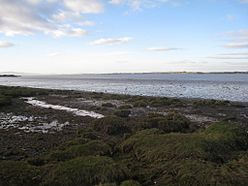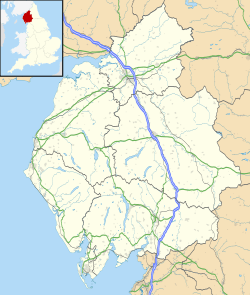Milecastle 80 facts for kids
Quick facts for kids Milecastle 80 |
|
|---|---|

View over the Solway Firth near the site of Milecastle 80
|
|
| Type | Milecastle |
| Location | |
| Coordinates | 54°57′10″N 3°12′55″W / 54.952908°N 3.215155°W |
| County | Cumbria |
| Country | England |
Milecastle 80 was a small fort built by the Romans in ancient Britain. It was one of many "milecastles" placed along Hadrian's Wall. These small forts were built about one Roman mile (around 1.6 kilometers) apart. They helped the Roman soldiers guard the famous wall.
Where Was Milecastle 80 Located?
The site of Milecastle 80 is in the village of Bowness-on-Solway. This spot is very close to where a larger Roman fort, called Maia, once stood. Experts believe that the bigger fort might have replaced the smaller milecastle.
However, archaeologists have not yet found Milecastle 80 during digs at the fort. It's possible that the sea has slowly worn away some of the land over time. This "coastal erosion" might have washed away any remains of the milecastle.
The End of Hadrian's Wall
Hadrian's Wall was expected to finish its long journey at Bowness. But in 1707, a man named Bishop William Nicolson saw something interesting. He reported seeing an extension of the wall about a quarter of a mile west of Bowness.
This extra bit of wall would be like a "spur wall" found at the eastern end of Hadrian's Wall in Wallsend. However, no one has been able to find or confirm this extension since Bishop Nicolson's sighting.
What About Nearby Towers?
Every milecastle along Hadrian's Wall usually had two smaller guard towers nearby. These towers were called "turrets." They were placed about one-third and two-thirds of a Roman mile to the west of each milecastle. Soldiers from the milecastle would likely have guarded these turrets.
Since Hadrian's Wall was thought to end at Bowness, any structures further west would be part of a different defense system. This system protected the Cumbrian Coast. The possible towers between Milecastle 80 and the next fortlet, Milefortlet 1, are known as Tower 0A and Tower 0B. However, there is currently no proof that either of these towers ever existed.
 | Jewel Prestage |
 | Ella Baker |
 | Fannie Lou Hamer |


